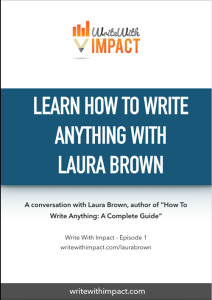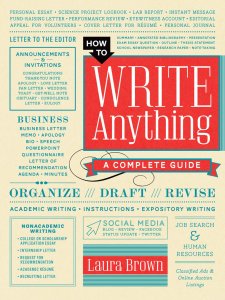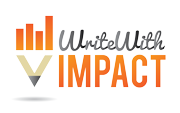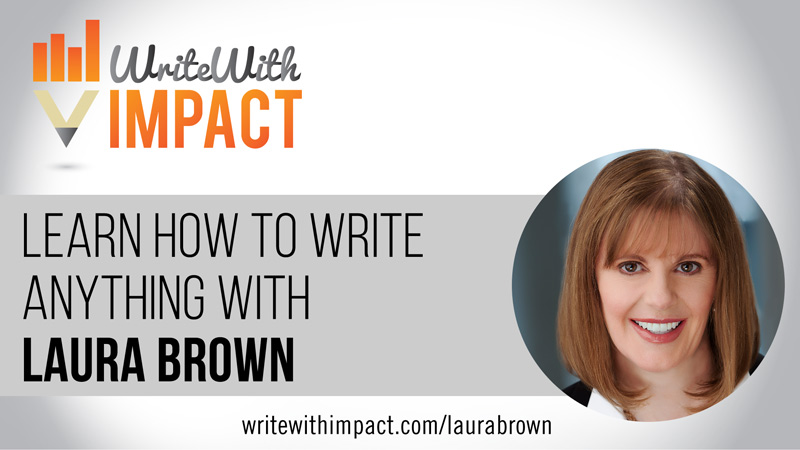Podcast: Play in new window | Download
Dr. Laura Brown
Dr. Laura Brown has taught writing to just about everyone – from corporate executives to high school students. She has more than 25 years’ experience providing training and coaching in business writing. She has also taught composition and literature at Columbia University, where she earned her PhD. Dr. Brown is the author of the new book, How To Write Anything: A Complete Guide. It’s one of the most comprehensive guides on writing available anywhere.
Highlights & take-aways
- Why she developed the six-step approach to writing that she calls, “The Writing Spinner”, as a device to help writers break-through the traditional linear writing process and improve their writing productivity.
- The simple technique she recommends to tackle writer’s block.
- Why writers should take an unemotional stance toward receiving feedback, and why sometimes it’s a good idea to not accept feedback.
- How she took a templatized approach to organizing her 560-page book, How to Write Anything, and how she adopted a systematic, project management approach to the process of writing it.
- Why she looks to E.B. White as her writing “hero.”

Download the Complete Transcript of This Episode
Snippets from the conversation
Why she wrote a book about writing
“I think we’re all writing more now than we ever have before. I’m old enough to remember when the internet started, and some people were afraid that would mean the end of writing. I think it’s just been the opposite. Writing is our primary means of communication at work now. So I thought that there was a real need to update the support that writers get.”
The Writing Spinner
Laura introduces “the writing spinner”, a six-step approach to writing that frees you from the constraints of having to go through a linear writing process.
- Understand your purpose
- Understand your reader
- Brainstorm your content
- Organize
- Draft
- Revise
Tweet: “You can start writing anywhere in the process: just start” – Laura Brown http://ctt.ec/BKQrD+ @impactfulwriter
Getting over writer’s block
“80% of the people I talked to told me they had writer’s block at one time or another. And I always try to get to the bottom of that. There are a lot of reasons behind writer’s block, and I think if you can understand what’s stopping you then you can overcome it.” “Why don’t you just write it as though you were explaining it to your grandmother. Your grandmother’s on your side, she’s not going to be looking for any fancy literary jargon. Just explain it to her and then you can work with the style from there.”
The importance of email
“Emails are a lot more important I think than most people realize. For one thing they are permanent, and they belong to your company, so you’re speaking for your company. And you’re also communicating with human beings, and you don’t have that sort of facial connection that you have when you’re speaking face to face, but your tone does matter, and people will hear it as your voice. …The tone in your emails really matters because these are your teammates, and you’re trying to build relationships with them. Email is more than just conveying information, it’s relationship building within the organization and also with clients and customers.”
Tweet: #Email is more than just conveying information, it’s relationship building within the organization & w/clients http://ctt.ec/2Ja0Q+
Building confidence
“People are much better writers than they think they are in most cases. And I try to help people not beat themselves up.” “There’s nothing wrong with you if you find writing hard. People come to me and they say, ‘Oh, I can’t write, it’s so hard’. Well, it’s okay that it’s hard, it’s an objectively hard thing to do. It’s not going to make it much more fun to acknowledge that it’s hard, but it’s okay, it doesn’t mean that there’s anything wrong with you.” “I focus a lot on process, helping people work from their own strengths, working from what they do know, and really a lot of it is thinking of it from the point of view of the reader.”
Receiving feedback (and sometimes disregarding it)
“It’s really important if you’re going to grow as a writer to be able to separate your emotions from your judgment. I think a lot of times if you get feedback that is critical, your emotions might flare up and you might reject it. You need to be able to dial it back, calm down and listen to what they’re hearing, because maybe they’re right. The other thing is, maybe they’re wrong. I think that’s really the key – you really need to be able to receive some feedback. Think about it and decide yeah, I know that’s not helpful. Coming from a place of judgment rather than a place of emotion.”
Laura’s writing “hero”
“I think my biggest hero is E.B. White…He had this beautiful, clear voice, and tremendous economy of language. And he was able to put his personality into the writing without being intrusive… I really love his writing.”
Download the Complete Transcript of This Episode
How to contact Laura
Laura Brown invites you to contact her through her website: www.howtowriteanything.com
Buy her book
How To Write Anything: A Complete Guide
 A practical guide to everything you’ll ever need to write—at work, at school, and in your personal life.
A practical guide to everything you’ll ever need to write—at work, at school, and in your personal life.
With more than two hundred how-to entries and easy-to-use models organized into three comprehensive sections on work, school, and personal life, How to Write Anything covers a wide range of topics that make it an essential guide for the whole family. You want your boss to fund a special project. How can you write a persuasive email that will win his approval? It’s time to apply to college. How can you write an essay that will stand out? The mother of one of your co-workers has died. What’s the best way to express your condolences?
Grounded in a common-sense approach, friendly and supportive, How to Write Anything is Internet-savvy, with advice throughout about choosing the most appropriate medium for your message: e-mail or pen and paper. At once a how-to, a reference book, and a pioneering guide for writing in a changing world, this is the only writing resource you’ll ever need.
But this book on Amazon: How to Write Anything: A Complete Guide


I read your article on LinkedIn. I want to say that without feedback, a beginning writer will never know what he/she is doing wrong. I had the good fortune to have a member of Virginia Romance Writer’s read my first ms and give me detailed feedback. Only then did I understand what other people had hinted at. Later, I judged contests for Viriginia Romance Writers and RWA. I always wrote at least a page of contructive criticism telling the author what to do to help her with her writing. I signed my name. I was at a mystery writers conference in Fort Lauderdale when a lady read my name tag and began screaming, “you’re the reason I’m published!” She called all her friends over to meet me. I was thrilled that I had helped her and that she had taken my advice. I still critique for friends and I have started writing again after being away from it for several years. I never stopped. I just didn’t have time for groups anymore with taking care of children.
Hello Leecy,
Thanks so much for your comment! A very inspiring story, thanks for sharing that.